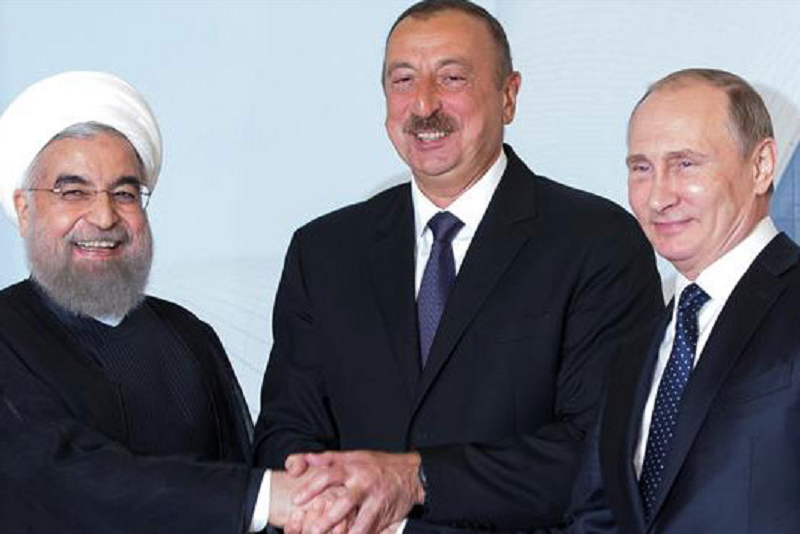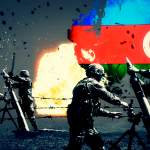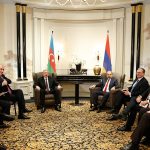- 15 August, 2016
- Foreign Policy

The Azerbaijan-Iran-Russia trilateral meeting in Baku on August 8 has become a subject of unprecedented attention.
Interestingly, such a trilateral regional meeting with the participation of Iran was organized for the first time. There had been no previous instance of Iran’s participation in a trilateral meeting with Russia and a South Caucasian country. And though Baku is presented as the initiator of this meeting, a question arises. Namely, why did Iran choose Azerbaijan’s capital as the arena for the first regional discussion? Though Iran does not have any pronounced contradictions with any of the three Transcaucasian republics, nevertheless there has been some tension in its relations with Azerbaijan for decades. Conversely, Tehran’s relations with Armenia and Georgia have always been considerably warmer during the post-Soviet period.
Moreover, in contrast to Azerbaijan, Tehran’s relations with Armenia used to be the warmest at least so much that during the period of sanctions against Iran, Armenia was accused of an attempt to enter into illegal bank transactions with Iran. And the country voicing the related accusations in front of the international community was Azerbaijan. Nevertheless, Iran chose Azerbaijan as a partner for the new regional cooperation format.
There are three main reasons for this choice:
1) The first reason is the tardiness of the Armenian diplomatic circles. While the Azerbaijani diplomats are having numerous meetings with the Iranian Government representatives, the Armenian Foreign Ministry barely manages to sign memoranda. Moreover, after Armenia became member of the EAEU, any economic agreement between Armenia and Iran should also be approved by Moscow, a circumstance that in its turn limits Armenia’s possibilities to act.
2) It is difficult to call Iran-Armenia relations quickly growing ones after the sanctions against Iran were lifted. However, there has been one issue in which Armenia has been the initiator. That is the creation of a free trade zone between Iran and the Eurasian Economic Union. And though the initiative belonged to Armenia, Azerbaijan will benefit most from its implementation because from now on the cargo transportation between Iran and the EAEU will be done through the territory of Azerbaijan. And this is not related to Iran’s and Azerbaijan’s preferences only. Such a change would have been impossible if not for the presence of respective preferences by Moscow. The trilateral meeting in Baku once again pointed to the importance of Azerbaijan for Moscow. In order to tie Azerbaijan to the EAEU, Moscow gives new “sweets” in the form of economic interests to it, while the already devastated economy of Armenia gets the “lashes” only.
3) It is also important that the trilateral meeting in Baku once again showed that there is some change in Iran’s attitude towards Armenia. In the first place, there is a change in Iran’s attitude towards the Nagorno Karabagh conflict. Previously, Iran used to adopt quite a neutral position on the regulation of the Nagorno Karabagh issue. However, that neutrality is increasingly vanishing. In particular, Iran has started to periodically put a stress on the territorial integrity of Azerbaijan. This time, too, IRI President Hassan Rouhani has made a vague reference to the principle of territorial integrity and the necessity of peaceful resolution of the Nagorno Karabagh conflict. Hence, it is not surprising that some Iranian analysts have been actively insisting on the necessity of transferring the Karabagh regulation process from the international platform to the regional one. For instance, Jahangir Karimi, who studies the Iran-Russia relations and the Eurasian regional developments, considers that the regional issues should be regulated by Iran, Russia and Turkey. Moreover, according to him, Moscow showed its willingness to take steps in that direction for the first time during the meeting in Baku.
In fact, the rapid growth of Iran-Azerbaijan-Russia economic relations and the Aliev-Putin-Rouhani meetings held in Baku serve as an evidence of Armenia’s yet another failure of regional policy because the only truly neutral country in the region has taken the path of de-neutralization.
Anna Pambukhchyan
“Union of Informed Citizens”


 Հայ
Հայ Рус
Рус


